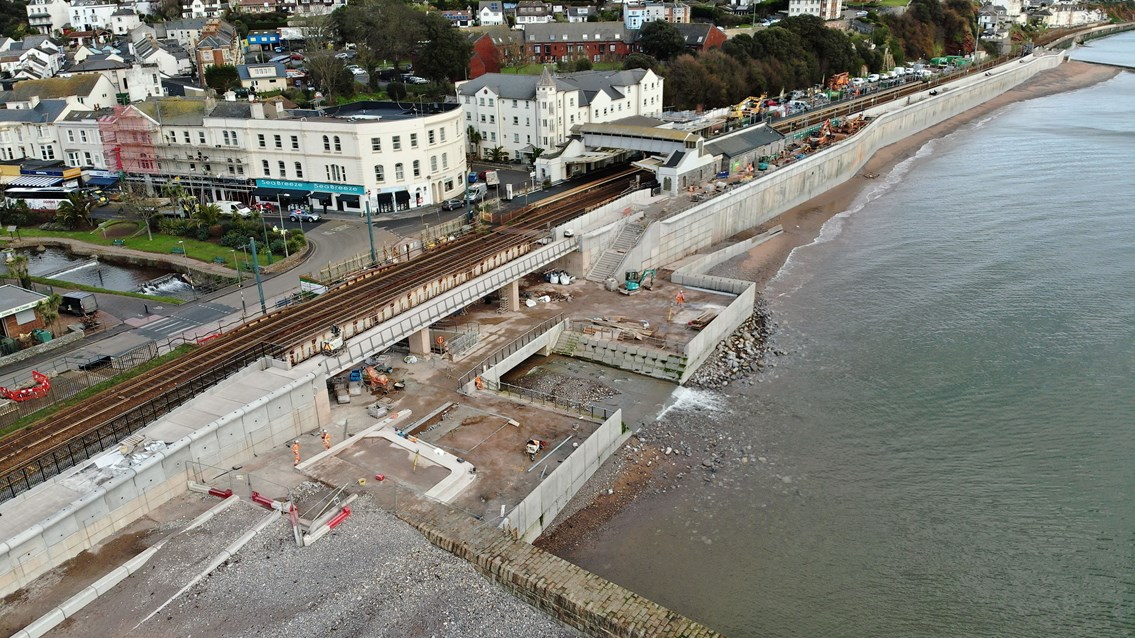Friday 24 Feb 2023
New, bigger sea wall to protect railway and town of Dawlish reaches final stages as Colonnade underpass reopens to the public
- Region & Route:
- Wales & Western
- | Wales & Western: Western
Work on the construction of the £80m new, bigger sea wall to protect the railway in Dawlish has reached its final stages as a new link bridge and stilling basin nears completion at Colonnade viaduct.
Removal of heavy machinery from the beach means step-free access to King’s Walk promenade and beach from Colonnade underpass is due to reopen tomorrow (Saturday 25 February).
Work on the 415 metre second section of new sea wall – stretching from Coastguard breakwater northeast of Dawlish station to Colonnade breakwater – with its wider, safer public promenade, began in November 2020. This followed the completion and opening of the first section of new sea wall in July 2020, which runs for 360 metres from Colonnade to Boat Cove. The second section of new sea wall reached a major milestone last August with the installation of all 164 wall panels, 203 pre-cast blocks and 189 recurve units, which return waves back out to sea. Since then, Network Rail’s contractors BAM Nuttall have focused on joining the two sections of wall with a link bridge that runs parallel to Colonnade viaduct, and building a new stilling basin where Dawlish Water runs under the viaduct and into the sea.
Step-free access from Colonnade underpass to King’s Walk promenade along the completed first section of new sea wall has been temporarily closed since Autumn last year to keep everyone safe while the team has been working night and day in the confined space.
But with heavy machinery now removed from the beach and new paving installed, Network Rail will be reopening the first span underneath the viaduct to allow the public onto this section once more.
The new link bridge, stilling basin area and promenade, and beach between Colonnade and Coastguard breakwaters will remain closed for now while work continues in this area.
Alina Wolfe-Murray, Network Rail senior sponsor, said: “It’s great to see the new public areas really taking shape – we are making good progress. We have faced some considerable challenges during construction; not least the discovery of an uncharted gas main last summer which pushed our programme back by several weeks.
“We faced further delays over the winter when heavy rain, wind and freezing temperatures – which caused widespread disruption across the country including on the rail network – slowed down or prevented activities such as pouring concrete and grouting paving.
“The recent better weather has allowed us to push forward with creating the new public area around the stilling basin, where 140,000 granite blocks that make up the surface are being laid by hand.
“We’re pleased to say step-free access to King’s Walk and the beach is due to reopen on Saturday 25 February and we’d like to thank everyone for their patience while it has been closed.
“There’s still work to do and we are working to get it completed as soon as we can, depending on the weather. We’re looking forward to opening up more of the public areas later this Spring.”
Alan Cox, Managing Director, Transport, for BAM Nuttall said: “Our work with Network Rail at Dawlish is proof that great things can come from adversity. It’s a project that has exhibited incredible ingenuity and collaboration from everyone involved right from the outset back in February 2014. The physical challenges of the site have really tested the problem-solving skills of our engineers but the results are there for all to see. I’m particularly proud of the innovation that has been demonstrated, from the use of the WaveWalker to install piling to the use of low carbon concrete in the construction of the sea wall itself.
“Our work in Dawlish was always going to bring us into close contact with the local community and the efforts made by our team to communicate with and keep our neighbours informed about developments have been nothing short of exemplary. It’s a job that will leave a lasting legacy for the town, for the Great Western Railway and its customers. Like me, I am sure that it’s a project that the team will look back on with a great deal of pride and satisfaction.”
Notes to Editors
For more information, images & video or to arrange an interview with a member of the project team, please contact Rob Breckon by emailing Rob.Breckon@networkrail.co.uk or by calling 07395 390759.
Contact information
Passengers / community members
Network Rail national helpline
03457 11 41 41
Latest travel advice
Please visit National Rail Enquiries
Journalists
Rob Breckon
Head of Communications - Eastern
Network Rail
07395 390759
rob.breckon@networkrail.co.uk
About Network Rail
We own, operate and develop Britain's railway infrastructure; that's 20,000 miles of track, 30,000 bridges, tunnels and viaducts and the thousands of signals, level crossings and stations. We run 20 of the UK's largest stations while all the others, over 2,500, are run by the country's train operating companies.
Usually, there are almost five million journeys made in the UK and over 600 freight trains run on the network. People depend on Britain's railway for their daily commute, to visit friends and loved ones and to get them home safe every day. Our role is to deliver a safe and reliable railway, so we carefully manage and deliver thousands of projects every year that form part of the multi-billion pound Railway Upgrade Plan, to grow and expand the nation's railway network to respond to the tremendous growth and demand the railway has experienced - a doubling of passenger journeys over the past 20 years.
Follow us on Twitter: @networkrail
Visit our online newsroom: www.networkrailmediacentre.co.uk

